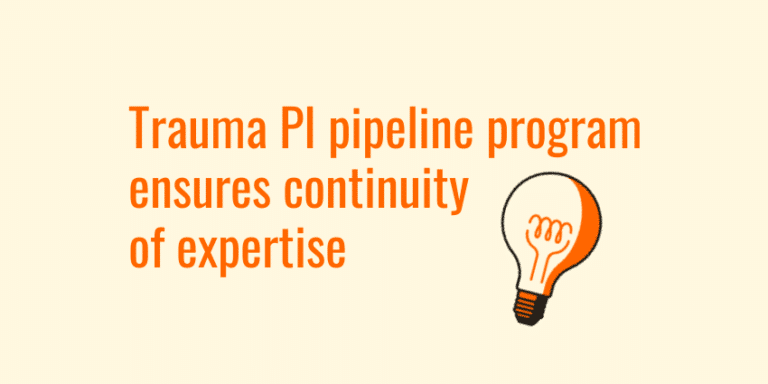One challenge in trauma performance improvement is the difficulty of maintaining PI expertise during periods of staff turnover. When a PI coordinator leaves a program, it can take a long time to hire a new lead and bring him or her up to speed on PI processes.
Trauma leader Jennifer Beecham, RN, AEMT, MHA, solved this problem by creating a talent pipeline program specifically for the trauma PI coordinator role. Beecham is the trauma program director at TriStar StoneCrest Medical Center, a Level III trauma center in Murfreesboro, Tennessee. Her program has both ensured continuity in PI expertise and enhanced ED nurses’ knowledge of trauma processes.
Challenge: Maintaining PI expertise across turnover
“Identifying prospective candidates for the trauma PI role often proves difficult due to a number of factors. Further, when a new PI coordinator is introduced to a trauma program, there is often no clear roadmap for smooth integration into the PI process. The outgoing PI coordinator has usually moved on before the onboarding PI coordinator arrives, leaving no one to train the new team member except the trauma program director. We faced this problem at our community Level III trauma center in 2021 when our PI coordinator informed me that she would eventually be leaving our hospital to move closer to family. We had just completed a successful state survey and had submitted our application for an ACS consultative visit.”
Innovation: Trauma PI recruiting and mentoring program
“I realized we needed a way to ensure the continuity of our PI efforts. My idea was to create a program for recruiting and mentoring ED nurses who want to learn more about trauma PI and might eventually fill the coordinator role — the Nursing-Trauma Performance Improvement Program (N-TPIP). I met with my CNO and shared my idea with her. My vision was to give nurses who might be interested in learning the other side of trauma (not bedside) an opportunity to work alongside the trauma PI coordinator, shadow the Trauma Department, and see what we do and why we do it. The targeted outcome: that they would go back to the bedside with a better understanding of the trauma program and potentially one day want to take on the role of a trauma PI coordinator. In October 2021, the Trauma Department was granted 8 hours a month to start the program. After obtaining buy-in from ED nursing leadership, we defined the program’s operational tasks and began recruiting potential candidates among our ED nurses.
N-TPIP Candidate Criteria
- Full-time employee of the hospital
- Active nursing license
- Minimum of 2 years’ experience in the ED
- Active member of the Trauma Champions Committee
- Certifications in BLS, TNCC, ACLS and PALs
- Submit essay explaining interest in the program
Accepted candidates dedicate 8 hours per month to N-TPIP in addition to their regularly scheduled full-time hours.
Results: Seamless transition in PI leadership
“During the first year of this program, four ED nurses applied and one candidate met all criteria. This candidate was accepted into N-TPIP, and she was able to work alongside our outgoing PI coordinator prior to her departure. During this time, the candidate was able to experience survey prep and she also attended the ACS consultative visit. In May 2022, this N-TPIP candidate became the full-time PI coordinator. Just eight months into her full-time tenure, she played an instrumental role in our center’s successful ACS verification survey. After the success of N-TPIP’s first year, administration approved the program’s continuation and candidates were interviewed for the second year. Two candidates who met all criteria applied for the program, and our newest N-TPIP candidate started in April 2023. N-TPIP has proven to be an effective approach to ensuring the consistency of a high-quality trauma PI program. The success of the program is sustained by continued administrative investment as well as ED nurses’ enthusiasm to learn trauma PI processes. Programs like N-TPIP can easily be replicated by other institutions seeking to maintain continuity in trauma performance improvement.

